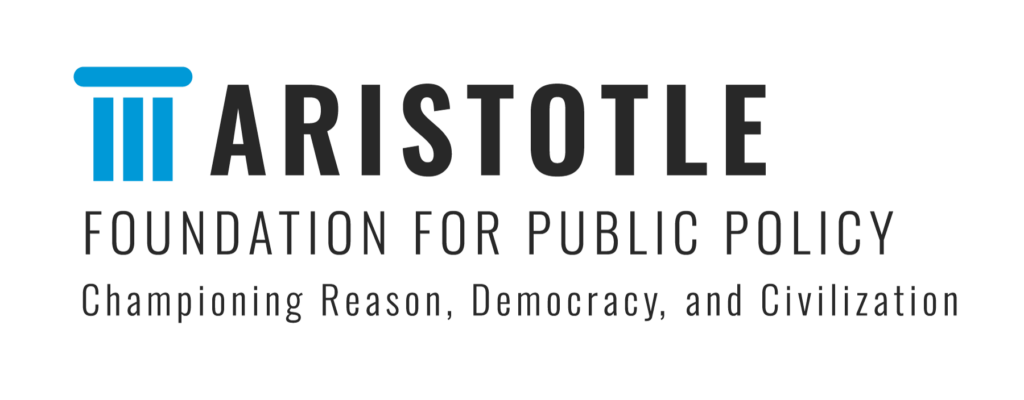

David Hunt, Western Standard, June 30, 2024
My wife and I were out for a long-overdue date night this week, and just before we could sit down, I was confronted with the following comment: “There is considerable nuance that you didn’t address in your new study!”
The study in question was a short reality check my colleague Matthew Lau and I wrote for the Aristotle Foundation for Public Policy on the facts about poverty and race in Canada. We used Statistics Canada data to show that, in this country, there are more white people in poverty than all other ethnicities combined (among other inconvenient truths).
We did this to spark public discussion on critically important issues that affect all Canadians—but especially the most vulnerable. For instance, why do we have any race-based “anti-poverty funding” redistributing taxpayers’ dollars in Canada?
Especially on Canada Day weekend, as we reflect on what brings us together and makes us Canadian, we should all be asking questions like this.
But, first, the nuance!
In fairness, that restaurant comment came from a dear friend who, with his lovely wife, was joining us for dinner. He’s an economist (a good one, at that), and thus, his comment merits addressing—it’s also one I’ve heard repeatedly in the last two weeks.
Yes, some visible minorities are more likely than others to be poor in Canada. Arabs, for example, are the most likely Statistics Canada cohort to live in poverty in Canada, when measured by household income. Indigenous and black populations are also disproportionately in poverty. But which cohorts are the least likely to be poor? In Canada, it’s Filipinos, South Asians, and Latin Americans. In fact, those of Filipino descent are far and away the least likely to be in poverty, regardless of how we measure it.
And yet, even amongst the groups with the highest per capita rates of poverty, less than one-fifth of them are poor. (That is, in the relative sense. Less than three per cent of Canadians are in absolute poverty, lacking the basic living necessities, so when we walk about the “poverty line” it is almost always in reference to a relative measure, like income.)
So, government—actually, taxpayer—funding that targets only indigenous or only black populations ends up excluding around 95 per cent of the poor. This is a shocking statistic, and just as shocking, if race not poverty is the criterion for “anti-poverty” funding, anywhere from 80 to 90 per cent of eligibility will be for those above the poverty line.
Race-based policy is un-Canadian, I explained to my friend.
“How so?” He responded.
Let’s start at 30,000 feet. Race-based discrimination—even in the name of righting past wrongs—is as unjust as it is destructive.
Throughout history, the norm around the world has been to divide people by groups—whether by ancestry, ethnicity, or some other group identifier. It’s called tribalism. And it almost always eventually leads to violent conflict.
Even today, look around the world. We still see the consequences of tribalism in the invasions of Ukraine and Israel, or the suppression of dissenting minorities in China and North Korea. We also see minorities suppressed in democracies like Brazil, the Philippines, and India, to name a few.
A Canadian is one who rejects tribalism. My neighbour is an individual, not a faceless member of a group. We have equal dignity and worth—and thus should receive equal treatment under the law. And in everyday life, how we judge each other is based on our character and conduct—not our ancestry or other surface-level “identifiers” beyond our control.
Consider our roots. (And, yes, “our” roots applies to all, even new Canadians like my friend.)
We were, and in many ways still are, British North Americans. Few today realize that to be “British”—as opposed to English or Scotch or Welsh—was to be a free individual. Britain is not a country, like England, but a “United Kingdom” of formerly warring tribes. It was the thirteen English, not British, colonies that rebelled in 1775 against the Crown, reclaiming their rights as Englishmen—to quote American founding father George Mason. New Scotland (Nova Scotia) and Britain’s recently acquired Province of Quebec (which included Ontario) did not. They formed British North America.
This is a critical distinction, which continued to play out in history.
Our first two prime ministers were neither English nor French but Scottish immigrants. Yes, immigrants! In fact, they did not belong to either of our “founding nations”, in a tribal sense. They were ethnic outsiders.
Likewise, our first prime minister from Quebec was not French but rather our first “English” prime minister.
When asked what it means to be Canadian, our first francophone prime minister, said this: “Canada is free, and freedom is its nationality.”
And Sir Wilfrid Laurier spoke these words a full generation after Confederation. It echoes not only the words of Prime Minister John Diefenbaker a generation later, but also our founding debates.
A few months before Confederation, as Mark Milke notes in The 1867 Project, William Lawrence rose in the House of Assembly and declared, “We are a free people, prosperous beyond doubt, advancing cautiously in wealth, under the protection of our good old flag…. Under the British Constitution we have far more freedom than any other country on the face of the earth.”
This wasn’t mere rhetoric. Canada at Confederation almost certainly fit the description: freest nation on earth.
Life was hard in Canada, for sure; still is. But British North Americans were free.
And perhaps this is our problem today. We want ease and comfort; whereas, freedom requires responsibility. The Dominion that was confederated on July 1, 1867, was a free but rugged society.
I think of my own grandparents. All of them were born in Canada and lived in poverty—absolute poverty—during the Great Depression. One went on to fight in the Second World War. Life was anything but easy. But they were free. And when compared to their peers around the world, even though they grew up with nothing, they had everything. In Canada, they had opportunity.
Back to my dinner conversation: When it comes to Canada—especially in the realm of public policy—perfection is not the standard, opportunity is. This is what Canada, historically, has offered.
And where people are free to choose and reject opportunities, there will be disparities. Race or “systemic discrimination” are not the reason for differences in income or poverty. As Matthew Lau points out in an earlier study for the Aristotle Foundation for Public Policy, when we compare Canadians with the same levels of education, the income differences between indigenous and non-indigenous Canadians, for example, fade almost entirely.
Nor should we desire “equality” in outcomes, as the only way to realize that is through coercion.
As we ordered dessert, I asked my friend, in light of all the challenges and disadvantages he and his wife have faced as immigrants, “Where would you rather live: In your birth country or here?”
Without hesitation, he said, “Canada, for sure!”
That’s the bottom line, folks.
David Hunt is the Research Director at the Aristotle Foundation for Public Policy.
Like our work? Think more Canadians should see the facts? Please consider making a donation to the Aristotle Foundation.

The logo and text are signs that each alone and in combination are being used as unregistered trademarks owned by the Aristotle Foundation. All rights reserved.
The Aristotle Foundation for Public Policy is a registered Canadian charity. Our charitable number is: 78832 1107 RR0001.
SUBSCRIBE TO OUR NEWSLETTER